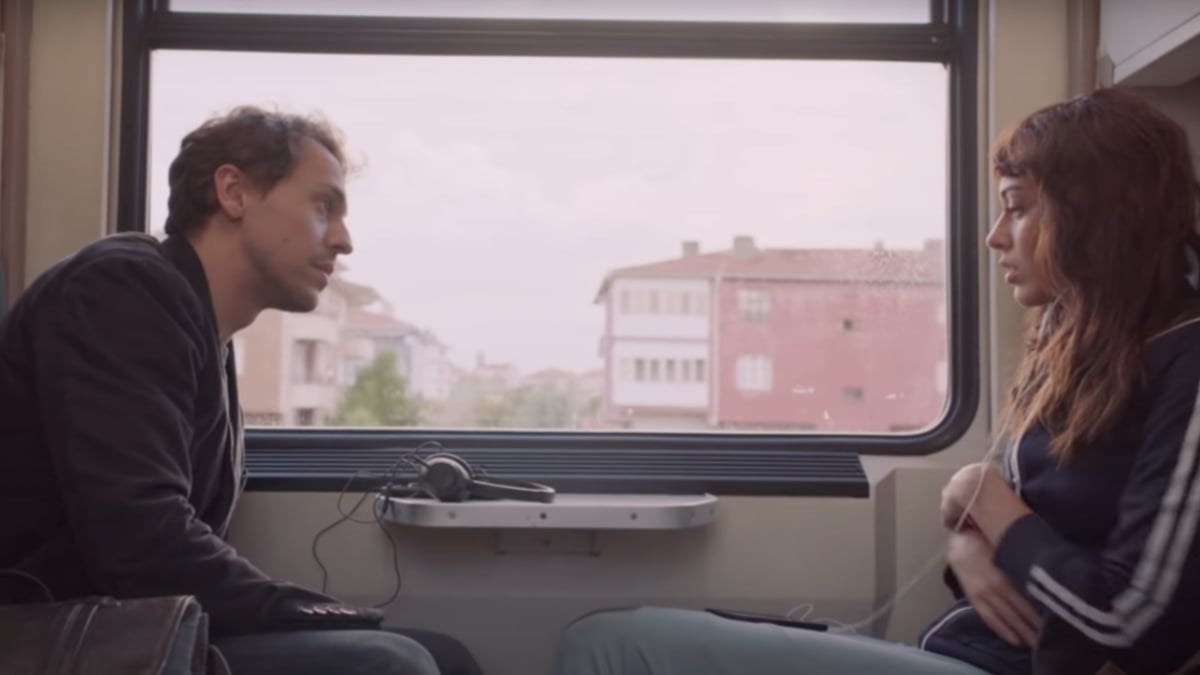
Love and relationships can be difficult, as well as painful. They can also leave a lasting scar that may never fade.
With One-Way to Tomorrow, two people work through their issues unexpectedly, while stuck on a train together for many hours.
The romantic-drama from Turkey is one of those rare indie films that take advantage of a small location for its entire runtime. Because of this, most of the movie relies on the performers to carry the film with dialogue and emotion.
We have recommended a lot of movies from Netflix, including Da 5 Bloods. But is this also worth the stream? Here is our full review of the latest film from Netflix, One Way to Tomorrow.
One-Way to Tomorrow review: Should you watch the Netflix movie from Turkey?
The film stars Metin Akdülger as Ali and Dilan Çiçek Deniz as Leyla, and from the start, the story places both main characters in a chance encounter.
Both are headed to a wedding, and as the conversation unfolds, it turns they are headed to the same wedding for very similar purposes.
And without spoiling anything, the more they talk about their reasons for attending the wedding, the more we see their heartache, regret, and anger towards the people who are planning to tie the knot.
When looking at the spirit of an indie foreign film, there are expectations to consider. For example, the location, budget, etc. Most of all, how effectively did they utilize their resources?
Looking back at director Ozan Açiktan’s previous efforts, he has done films that used several locations and cast members.
With One-Way to Tomorrow, it seems as though Açiktan decided to challenge himself by telling a single story, in a single location, with very few performers.
And from the perspective of trying to achieve this objective, he accomplished his mission.

Açiktan’s greatest strength here was finding actors able to elevate the script and drive viewers to care about these vulnerable characters. It’s hard for anyone to make two individuals talking and venting for 90-minutes interesting.
Furthermore, besides a few moments of external settings, One-Way to Tomorrow is filmed almost entirely in the claustrophobic confines of a train car.
To be able to set up shots and angles that fluidly flow in continuity in such a small space had to be a filmmaking nightmare. One can presume there was not much social distancing.
Due to this, the movie itself is impressive for its achievements in scale as well as narrative.
The movie does have its issues and mainly with pacing.
Throughout the experience of One-Way to Tomorrow, the film has moments that tend to fall out of rhythm and drag slightly.
Because the film does rely heavily on dialogue, if the pacing doesn’t keep the viewer strolling along, it can be an exercise to stick with the conversation.
While this does not persist throughout the film, there are patches where one will feel the runtime despite it being 90-minutes long.

Still, there is a lot to enjoy about this movie, including a soundtrack that contains a mixture of English language artists as well as Turkish. It’s a guarantee that some Netflix viewers will track some of the ditties down over the weekend.
And the performances from both Metin Akdülger and Dilan Çiçek Deniz are top-notch. They are both challenged to carry this film with nothing but words and acting.
Being asked to make conversation compelling with nothing to support it, like flashbacks, cut scenes, extra characters, or even explosive special effects, is truly remarkable.
These two performers sell the chemistry as well as rise to the challenge of making a sit-down conversation realistic and intriguing. This is not easy to do for any actor.
One-Way to Tomorrow can also be a metaphor for relationships.
Finding someone to spend the rest of one’s life with forever requires extreme vulnerability and communication. And oftentimes, it can be ugly, exciting, challenging, and require self-reflection.
It can also feel like one is stuck on a ride with someone that knows them better than they believe.
But it’s through that ride that most relationships come out stronger if one attempts to be vulnerable with the passenger sitting next to them. And that makes the final destination so much sweeter.
Overall Thoughts
One-Way to Tomorrow might have some issues with pacing and flow in various sections of the film. That said, for filmmakers who are seeking a study guide on how to make a movie utilizing one single location, this should be seen.
Between the performances, minimal location use, and strong dialogue, it’s a commendable effort for a small film. Furthermore, One-Way to Tomorrow has a lot to say about how being loved also requires being uncomfortably open.
Even if that openness means acknowledging our pain to the person right in front of us.
One-Way to Tomorrow is now streaming on Netflix.